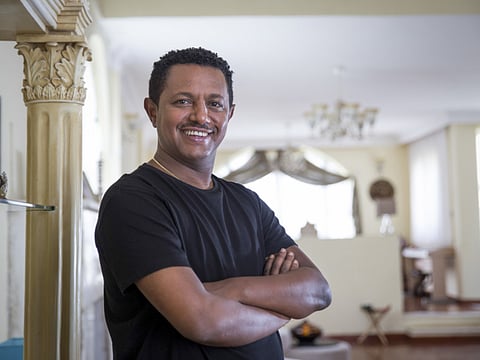Ethiopia’s star singer Teddy Afro makes plea for openness
He is topping the Billboard world albums chart with album ‘Ethiopia’, which less than two weeks after its release has sold nearly 600,000 copies

Teddy Afro, Ethiopia’s superstar singer, is topping the Billboard world albums chart with Ethiopia, which less than two weeks after its release has sold nearly 600,000 copies, a feat no other artist here has achieved.
Known for the political statements he makes in his music, an infectious mix of reggae and Ethiopian pop, the 40-year-old Tewodros Kassahun told The Associated Press that raising political issues should not be a sin.
Open debate “should be encouraged,” he said. “No one can be outside the influence of politics and political decisions.”
Ethiopia is an unlikely place for an outspoken singer to thrive. The government is accused of being heavy-handed on opposing voices.
During a visit this month, UN human rights chief Zeid Ra’ad Al Hussain expressed concern about the state of emergency imposed in October after months of deadly anti-government protests demanding wider freedoms. Opposition and human rights groups blame security forces for hundreds of deaths, but the government says they largely used “proportionate” measures.
The human rights chief also criticized Ethiopia’s anti-terrorism laws, saying an “excessively broad” definition of terrorism may be misused against journalists and opposition members.
In Ethiopia, the songs highlight the diversity of the country’s 100 million people while encouraging national unity. Pointing to Ethiopia’s formative role in launching the African Union continental body in 1963, Teddy said his country should find more cohesiveness at home.
“A country that tried to bring Africans together is now unable to have a unified force and voice,” he said. “The tendency nowadays here in Ethiopia is to mobilise in ethnic lines, not ideas.”
In his new album, Teddy sings mainly in Amharic but incorporates other local languages, which has been well-received by Ethiopians as a call for national unity.
At the same time, some of his songs have been interpreted as carrying political messages against Ethiopia’s ruling elites, leading some fans to say his outspokenness has made him a target.
In 2008, the singer was sentenced to two years in prison for a hit-and-run manslaughter but was released after 18 months in jail. He said he was never inside the car, and his fans suggested it was a politically motivated harassment by the ruling party. Hundreds of Ethiopians protested outside the court during his trial in the capital, Addis Ababa.
Authorities also have frequently cancelled his concerts without explanation. “We have sustained a lot of damages. This is not right,” he said.
Asked if he has any political ambitions, the singer said: “Let me continue doing what I’m doing now and we will see what the future holds for other things.”



